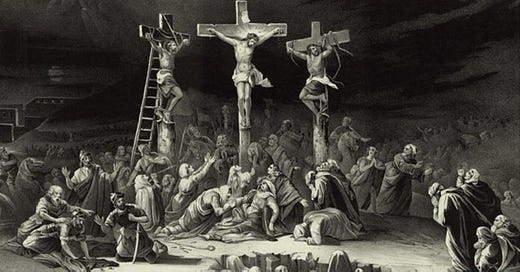As we enter Holy Week, I'm embarking on a powerful journey through Jesus's seven last statements from the cross. Starting with today's meditation on "Father, forgive them," we'll explore how these dying words speak directly to our divided world in 2025, challenging us to find healing and redemption at the foot of the cross.
"Father, forgive them, for they know not what they do." (Luke 23:34)
Stand with me at the foot of the cross. Not as a comfortable churchgoer, but as witnesses to an execution. The air is thick with hatred. The ground beneath trembles with injustice. And hanging above us is Jesus of Nazareth, nails piercing through flesh and wood, his body wracked with unimaginable pain.
It is in this moment—this crucible of suffering—that Jesus speaks his first word from the cross: "Father, forgive them, for they know not what they do."
Let's examine what's happening here. In the Greek text, Jesus uses the present imperative form of “forgive,” suggesting not a one-time pardon but an ongoing act of forgiveness. He's not merely asking for a momentary suspension of judgment but for a continual flow of divine mercy. And who are "they"? The Roman soldiers driving in the nails? The religious leaders who orchestrated his death? The crowds who demanded his crucifixion? The disciples who abandoned him? The text doesn't specify, and perhaps that's intentional. Maybe it was meant to reach those who crucified him then, and maybe it was meant to reach all of us who continue to crucify him now through our sin, our indifference, our hatred.
And notice the reason given: "for they know not what they do." This is not excusing their actions but acknowledging a profound spiritual blindness. The Apostle Paul would later write in 1 Corinthians 2:8, "None of the rulers of this age understood it, for if they had, they would not have crucified the Lord of glory." There's a tragic ignorance at work—people acting out of limited, distorted understanding, blind to the cosmic significance of their actions.
In 2025, these words echo across a chasm of division that seems to widen with each passing day.
Look at our political landscape. The left views the right as heartless oppressors, willing to sacrifice the vulnerable on the altar of tradition and profit. The right sees the left as godless radicals, determined to dismantle every sacred value and institution. Between these warring camps stands the cross—a symbol both sides claim but whose message of sacrificial love and radical forgiveness neither side fully embraces.
We see this division playing out in real time. Conservative Christians point fingers at progressive policies on gender and sexuality, declaring them evidence of moral collapse. Progressive Christians condemn conservative stances on immigration and social welfare as betrayals of Jesus's command to love our neighbors. Both sides have their Scripture verses ready as ammunition, their righteous indignation fully charged.
And it's not just politics. Our social media feeds have become echo chambers where we gather evidence of the other side's depravity. We don't seek understanding; we seek confirmation of our prejudices. We don't engage; we denounce. We have mastered the art of dehumanizing those who disagree with us.
And in this climate of mutual contempt, Jesus whispers: "Father, forgive them, for they know not what they do."

Here's the revelation that should stop us in our tracks: We are all the "them" in Jesus's prayer.
We are all caught in webs of ignorance and self-deception. We are all participating—knowingly or unknowingly—in systems of injustice. We are all, at times, driving nails into innocent flesh through our words, our actions, our indifference.
The Christian conservative judging the humanity of transgender youth doesn't fully understand the damage they're inflicting. The progressive activist mocking people of faith doesn't see how they're mimicking the very intolerance they condemn. The liberal Christian allowing people to do whatever they want in the name of love doesn't recognize how permissiveness can lead people away from God's transformative truth. The moderate sitting comfortably on the sidelines doesn't recognize how their apathy enables suffering.
Our responsibility as Christians is not to "get it right" politically or culturally—it's to follow Jesus who is righteousness personified. When we substitute our own understanding of righteousness for the living Christ, we all fall short, regardless of where we land on the ideological spectrum.
Jesus's prayer reveals a startling truth: Even the most heinous act in human history—the crucifixion of God's Son—was carried out by people who didn't fully comprehend what they were doing. How much more might this apply to our comparatively lesser conflicts?
This is not moral relativism. It's not saying that truth doesn't matter or that all positions are equally valid. Rather, it's an acknowledgment of our profound human limitation—our inability to see the full picture, to understand the complete impact of our words and actions, to recognize our own blindness.

So what does this mean for us in 2025, living in a world of disinformation, cancel culture, and culture wars?
First, it means we must cultivate humility. When Jesus prayed for forgiveness from the cross, he modeled a radical perspective: that even his executioners deserved compassion because of their limited understanding. If that's true, how much more should we approach our social and political opponents with humility about our own certainties?
Second, it calls us to practice forgiveness as a discipline. Forgiveness is not a feeling; it's a decision and an ongoing practice. It doesn't mean abandoning justice or accountability. But it does mean refusing to let resentment and contempt become our driving forces.
Third, it challenges us to seek understanding. When Jesus said, "they know not what they do," he wasn't dismissing his persecutors; he was acknowledging the complex reality behind their actions. Can we approach those we disagree with not as enemies to be defeated but as complex human beings whose perspectives—however misguided we might find them—make sense within their framework of understanding?
This is not about calling you to an altar at the front of a church. I'm calling you to the altar of the cross—the place where divine forgiveness and human ignorance collide.
I'm asking you: Who do you need to forgive today? What person or group have you dehumanized in your mind? Where have you been nursing grievances instead of extending grace?
And equally important: Where might you need to acknowledge your own ignorance? What issues have you been absolutely certain about that might look different from another perspective? Where might you be driving nails without fully understanding what you're doing?
The world doesn't need more self-righteous Christians who have all the answers. The world needs followers of Jesus who embody his prayer from the cross—people who can stand in the midst of conflict and say, "Father, forgive them, for they know not what they do."
This is not weakness. It took unfathomable strength for Jesus to pray for his executioners as they were actively killing him. This is not compromise. It's the revolutionary power of grace that has the potential to transform our divided world.
As you read this today, let's carry this first word from the cross into our homes, our workplaces, our social media interactions, our political conversations. Let's be people who forgive not because others deserve it, but because we ourselves have been forgiven much.
For if there's one thing our fractured society needs in 2025, it's not more ammunition for our ongoing culture wars. It's the disarming power of forgiveness—a power revealed in the extraordinary words of a dying Savior who looked upon his killers with compassion and saw not monsters worthy of condemnation, but children of God worthy of grace.
"Father, forgive them, for they know not what they do."
May these words transform us from the inside out. May they make us agents of reconciliation in a world desperate for healing. And may they lead us all to the foot of the cross, where we discover that we are both the forgiven and the called to forgive.
Amen.







